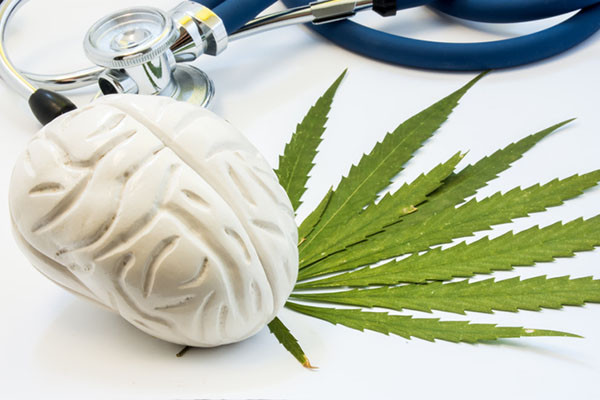Cognitive effects in midlife of long-term cannabis use

As of June 2022, 37 US states have passed medical cannabis laws and 19 states have legalized recreational cannabis. Cannabis has proven beneficial for a range of conditions such as childhood seizure disorders, nausea, vomiting, and loss of appetite in people with HIV/AIDs.
In the meantime, a new generation of cannabis products has exploded onto the scene, driven by marketing that fuels a multibillion-dollar industry. The average content of THC (tetra-9-tetrahydrocannabinol, the psychoactive and potentially addictive chemical in cannabis) in smoked whole-plant products has risen from 1% to 4% in the 1970s to 15% to 30% from today's cannabis dispensaries. Edibles and vapes may contain even higher concentrations of THC.
While public perception that cannabis is a harmless substance is growing, the long-term benefits and risks of cannabis use remain unclear. However, one consistent pattern of research has emerged: heavy long-term cannabis use can impact midlife cognition.
New research on cannabis use and cognition in midlife
Recent research published in The American Journal of Psychiatry closely followed nearly 1,000 individuals in New Zealand from age 3 to age 45 to understand the impact of cannabis use on brain function. The research team discovered that individuals who used cannabis long-term (for several years or more) and heavily (at least weekly, though a majority in their study used more than four times a week) exhibited impairments across several domains of cognition.
Long-term cannabis users' IQs declined by 5.5 points on average from childhood, and there were deficits in learning and processing speed compared to people that did not use cannabis. The more frequently an individual used cannabis, the greater the resulting cognitive impairment, suggesting a potential causative link.
The study also found that people who knew these long-term cannabis users well observed that they had developed memory and attention problems. The above findings persisted even when the study authors controlled for factors such as dependence on other drugs, childhood socioeconomic status, or baseline childhood intelligence.
The impact of cannabis on cognitive impairment was greater than that of alcohol or tobacco use. Long-term cannabis users also had smaller hippocampi (the region of the brain responsible for learning and memory). Interestingly, individuals who used cannabis less than once a week with no history of developing dependence did not have cannabis-related cognitive deficits. This suggests there is a range of recreational use that may not lead to long-term cognitive issues.
More studies are needed on cannabis use and brain health
The new research is just one of several studies suggesting there is a link between long-term heavy cannabis use and cognition. Still, future studies are needed to establish causation and explore how long-term cannabis use might impact the risk of developing dementia, since midlife cognitive impairment is associated with higher rates of dementia.
What should you do if you experience cognitive effects of cannabis?
Some people who consume cannabis long-term may develop brain fog, lowered motivation, difficulty with learning, or difficulty with attention. Symptoms are typically reversible, though using products with higher THC content may increase risk of developing cognitive symptoms.
Consider the following if you are experiencing cannabis-related cognitive symptoms:
- Try a slow taper. Gradually decrease the potency (THC content) of cannabis you use or how frequently you use it over several weeks, especially if you have a history of cannabis withdrawal.
- Work with your doctor. Be open with your doctor about your cognitive symptoms, as other medical or psychiatric factors may be at play. Your doctor can also help you navigate a cannabis taper safely, and potentially more comfortably, using other supportive means. Unfortunately, most patients are not comfortable talking with their doctors about cannabis use.
- Give it time. It may take up to a month before you experience improvements after reducing your dose, as cannabis can remain in the body for two to four weeks.
- Try objective cognitive tracking. Using an app or objective test such as the mini-mental status exam to track your brain function may be more accurate than self-observation. Your mental health provider may be able to assist with administering intermittent cognitive assessments.
- Consider alternative strategies. Brain function is not static, like eye color or the number of toes on our feet. Aerobic exercise and engaging in mindfulness, meditation, and psychotherapy may improve long-term cognition.
Cannabis is an exciting yet controversial topic that has drawn both hype and skepticism. It is important for individuals and healthcare professionals to place emphasis on research studies and not on speculation or personal stories. Emerging studies suggesting the connection between long-term heavy use of cannabis and neurocognition should raise concern for policymakers, providers, and patients.
About the Authors

Kevin Hill, MD, MHS, Contributor

Michael Hsu, MD, Guest Contributor
Disclaimer:
As a service to our readers, Harvard Health Publishing provides access to our library of archived content. Please note the date of last review or update on all articles.
No content on this site, regardless of date, should ever be used as a substitute for direct medical advice from your doctor or other qualified clinician.















